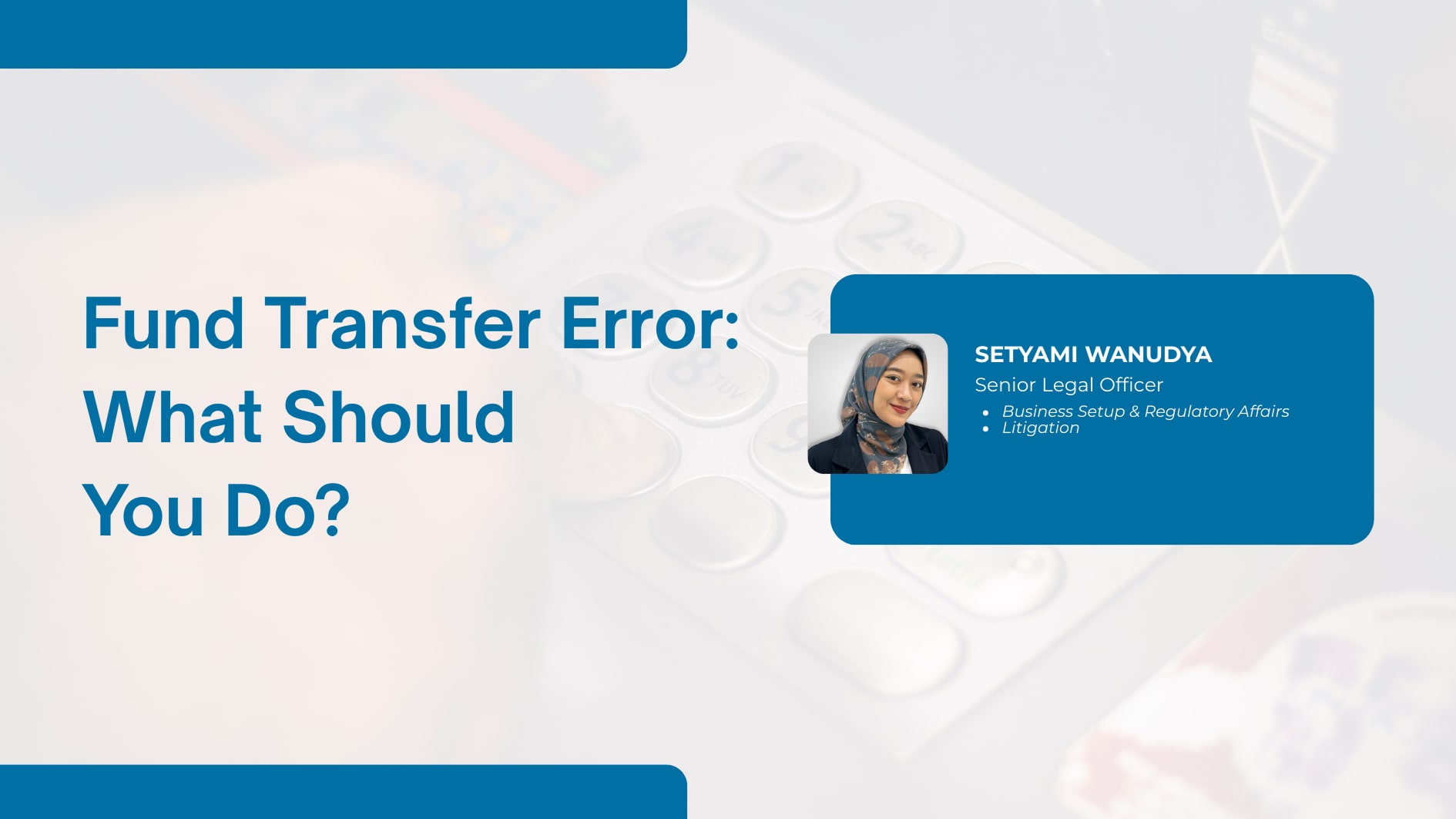Fund transfer errors frequently occur due to incorrect account numbers entered by individuals, companies, or even the banks themselves. According to Article 1 of Law Number 3 of 2011 concerning Fund Transfers, a fund transfer is defined as:
“A series of activities starting with an instruction from the Originator aimed at transferring a certain amount of funds to a Beneficiary specified in the Fund Transfer Order, until the funds are received by the Beneficiary.”
One notable case involving a fund transfer error occurred at Bank BRI, where a priority customer was reported as a suspect in a mistaken transfer case. As stipulated in Article 85 of Law Number 3 of 2011:
“Any person who intentionally takes possession of and claims ownership over funds resulting from a transfer, knowing or reasonably should have known that the funds do not rightfully belong to them, shall be subject to a maximum imprisonment of five (5) years or a fine of up to IDR 5,000,000,000 (five billion rupiah).”
The criminal elements in Article 85 — “intentionally taking possession and claiming ownership” — may be excluded if the recipient of the funds takes proactive steps to clarify or inquire with the bank regarding the unexpected transaction. The term “intentionally” under this article implies that intention, action, and consequence must all be present; if any of these elements are not met, the act may not be categorized as a criminal offense.
In cases where the funds are not returned after the bank has formally notified the recipient and requested a refund, the recipient may also be prosecuted under Article 372 of the Indonesian Penal Code (KUHP) on embezzlement:
“Anyone who unlawfully and intentionally takes possession of a movable object, wholly or partly belonging to another person but in their possession not as a result of a crime, shall be punished for embezzlement with a maximum imprisonment of four (4) years or a fine of up to nine hundred rupiah.”
The bank is required to prove that a transfer error occurred by showing evidence of the original transfer instruction from the Originator and the intended Beneficiary. This obligation is stipulated in Article 78, which states:
"In the event of a delay or error in fund transfer resulting in losses to the Originator or Beneficiary, the Payment System Operator and/or any other party in control of the Fund Transfer System shall bear the burden of proving the existence or non-existence of such delay or error.”
According to Article 5 paragraph (1) of Law Number 3 of 2011, a fund transfer instruction that has been accepted constitutes a valid agreement. The process involves an offer (the transfer instruction from the Originator to the Payment System Operator) and an acceptance (the promise to pay by the receiving operator). Once accepted, the instruction forms a binding agreement between the Originator and the Beneficiary.
Legal expert Prof. M. Yahya Harahap explains:
"If the transfer instruction given by the Originator to the Receiving Operator complies with Article 1330 of the Indonesian Civil Code, then the resulting agreement has legal force as stipulated in Article 1338 of the Civil Code — binding the parties as if it were a law that cannot be withdrawn."
If the error in fund transfer is due to the bank's negligence, Article 57 mandates that the bank must provide protection to the customer for such mistakes. The bank is also obligated to comply with Article 57 paragraphs (1) and (2):
- (1) “If the Receiving Operator incorrectly accepts a Fund Transfer Order so that acceptance is made on behalf of an unauthorized recipient, the Receiving Operator must correct the error and accept the order for the rightful recipient.”
- (2) “A Receiving Operator who delays correction of such an acceptance error must pay fees, interest, or compensation to the rightful recipient.”
Legal Framework and Solutions for Fund Transfer Errors in Indonesia
According to Bank Indonesia Regulation Number 14/23/PBI/2012 concerning Fund Transfers, Article 11 paragraph (2) stipulates:
"In the event that the Fund Transfer Operator makes an error in the execution of the fund transfer as referred to in paragraph (1), the Operator must correct the error no later than one (1) Business Day after the error is discovered."
Furthermore, Article 47 of Law Number 3 of 2011 concerning Fund Transfers regulates the return of funds under force majeure conditions:
- The Originator’s Operator must return the funds to the Originator.
- If there is a delay in the return of funds, the Originator’s Operator is obligated to pay fees, interest, or compensation (as regulated in Article 19 of Bank Indonesia Regulation Number 14/23/PBI/2012 on Fund Transfers).
Regarding the return of funds by operators whose business activities have been suspended, licenses revoked, or declared bankrupt, Articles 50 and 51 of the same Law stipulate:
- Fund transfer instructions must still be executed if they have been initiated by the Originator’s Operator between 00:00 and the time of operational system closure due to business suspension or license revocation.
- Fund transfers must also be completed if initiated before a bankruptcy ruling is declared.
- If the Originator’s Operator is the one whose business is suspended or license revoked and the transfer instruction has not yet been executed, the funds must be returned to the Originator.
- Similarly, if the intermediary (Forwarding Operator) is affected, the transfer must be returned unless it has been fully processed.
- If the Final Receiving Operator is affected, and there is no error in the transfer instruction, the funds are the rightful property of the designated Recipient. If there is an error, the funds remain the right of the initial Sender who made the mistake.
In accordance with Article 53 of Law Number 3 of 2011 on the return of funds based on court rulings:
- The Final Receiving Operator must withhold or retrieve the transferred funds as long as the funds remain in the Recipient’s account or have not been withdrawn in cash.
- The withheld or retrieved funds must then be returned to the rightful party as determined by the court decision.
Steps to Take if You Experience a Fund Transfer Error (For Customers)
- Immediately report the issue to the police.
- Notify your bank as soon as possible.
- Prepare personal identification and submit it to Customer Service.
- Provide supporting evidence (e.g., transaction receipt or transfer proof).
- Wait for the bank’s verification process.
- If the recipient agrees to return the funds and all documentation is complete, the bank will facilitate the return process. At this point, the bank’s role becomes critical in confirming account balances and transaction history.
In general, if all processes go smoothly, customers can expect their funds to be returned within approximately 1x24 hours.
Conclusion
Fund transfer errors can be resolved through various legal and procedural avenues. For individuals and businesses requiring assistance, A&C is ready to support you through legal consultation and representation services related to fund transfer disputes.
*Disclaimer: This article is for general information only and does not constitute legal advice. We accept no liability for any consequences arising from its use. Unauthorized use or reproduction is prohibited and may result in legal action.
______
Sources:
- Law Number 3 of 2011 concerning Fund Transfers;
- The Indonesian Criminal Code (Kitab Undang-Undang Hukum Pidana);
- The Indonesian Civil Code (Kitab Undang-Undang Hukum Perdata); and
- Bank Indonesia Regulation Number 14/23/PBI/2012 concerning Fund Transfers.





